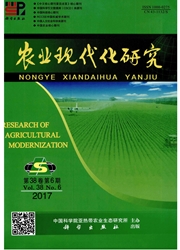

 中文摘要:
中文摘要:
农民专业合作社是国家构建新型农业经营主体的重要组成部分,保持和激励农户参与合作社的积极性至关重要。但是,在我国合作社发展过程中,农户“被参与”合作社的现象屡见不鲜。基于构建农户参与行为“自选择”和“被参与”的理论框架,利用在江苏、吉林和四川3省18个乡镇获得的合作社相关数据,运用GLM模型,在合作社层面分析合作社官方发起和功能对农户参与率的影响。结果表明,在功能较弱的合作社中具有官方背景的合作社参与率达53.5%,明显高于民间背景合作社(18.6%),而在功能较强的合作社中两者参与率没有明显差异;在民间背景合作社中,功能强的合作社参与率比功能弱的合作社高出15.8%,参与率与组织自身功能完善程度呈现出显著的正向关系,但官方背景合作社的参与率与其功能几乎没有关系,功能较弱的合作社参与率反而略高。研究表明,在目前的政策导向下,我国的农民专业合作社面临着严重的虚假参与问题,并且主要集中在具有官方背景且功能较差的那类“空壳”合作社之中。因此,我国合作社数量高速增长过程中的虚假参与问题应引起足够重视,有关部门应开始着手提高合作社准入门槛、加强补助资金监管力度,并适时调整合作社扶持思路。
 英文摘要:
英文摘要:
Cooperatives are important parts of the new agricultural business entities in China. Hence, it is of vital importance to inspire the enthusiasm of farmers to participate in cooperatives. However, during the rapid development of cooperatives, it occurred frequently that some farmers' participation in cooperatives was not voluntary, rather compulsory. Based on the data from 18 towns in Jiangsu, Jilin and Sichuan Provinces, by building a voluntarycompulsory framework, and applying the GLM model, this paper conducted an empirical analysis of the factors affecting the participation rate of cooperatives. Results show that, in the cooperatives with weak functions, participation rate of government-involved cooperatives (53.5%) is obviously higher than non-government-involved cooperatives (18.6%); while there is no significant difference in the cooperatives with powerful functions. Moreover, these 'functions' have positive influences on the participation rate in non-government-involved cooperatives, while it is irrelevant to the participation rate in government-involved cooperatives. This research also found that 'fake participation' does exist in reality, and this problem has been concentrated in the government-involved cooperatives with weak functions. Thus, 'fake participation' should cause enough attention and the Government should raise the threshold for the establishment of cooperatives, strengthen the supervision of subsides, and adjust the supportive policies to control the 'fake participation'.
 同期刊论文项目
同期刊论文项目
 同项目期刊论文
同项目期刊论文
 期刊信息
期刊信息
